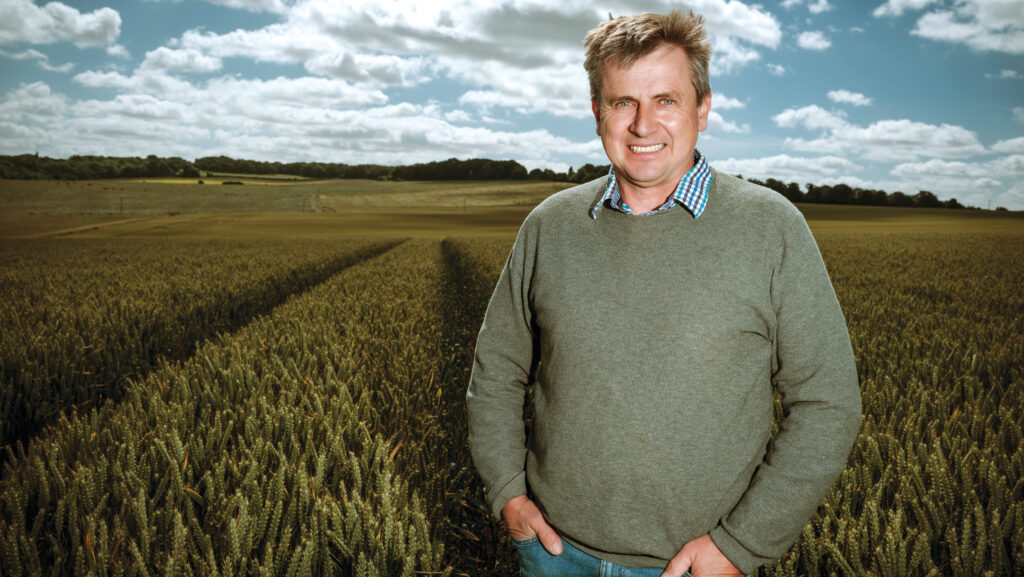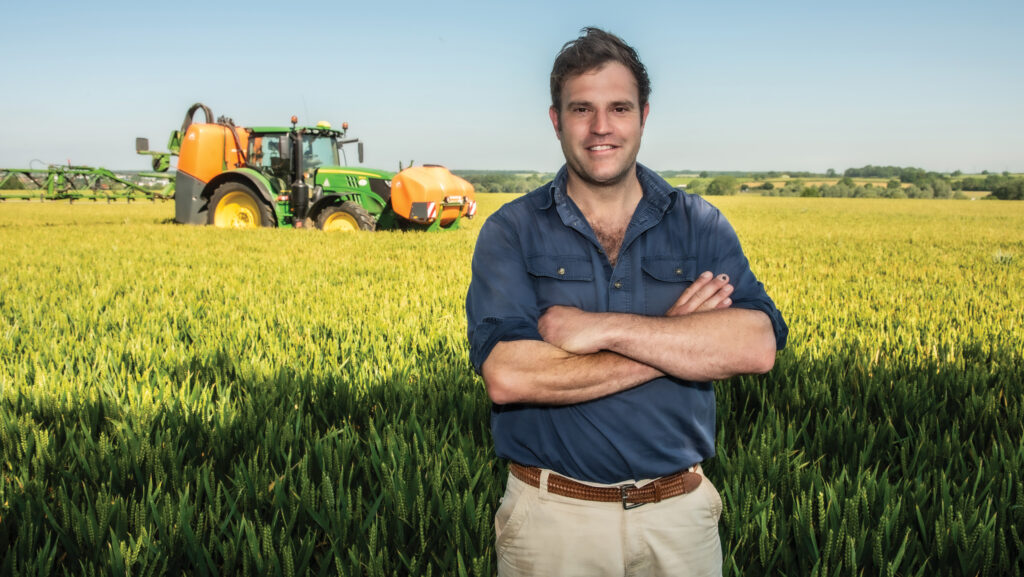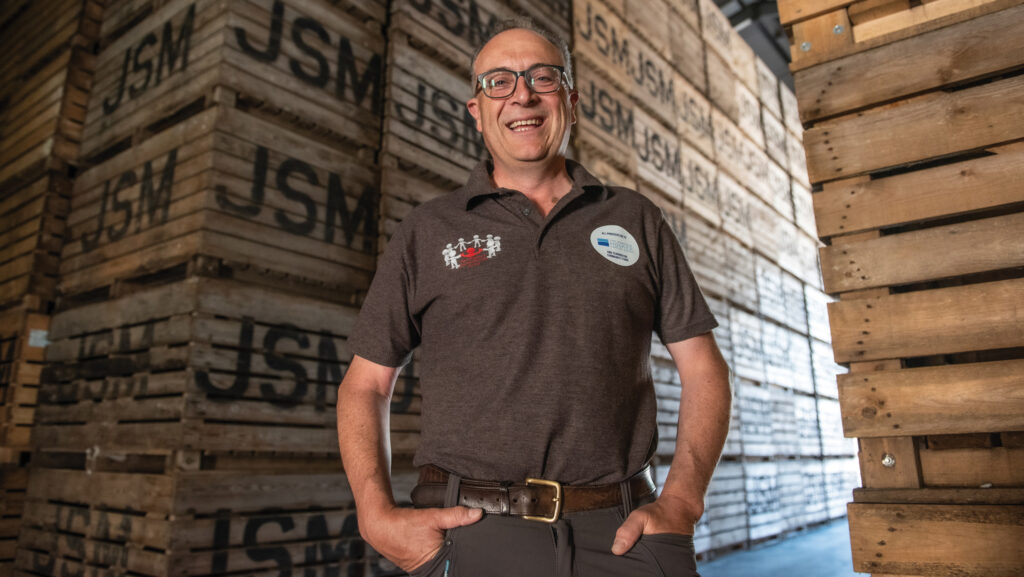Farmers Weekly Awards 2024: Arable Farmer of the Year finalists

All three arable finalists are seeing success with their war on blackgrass and are extracting impressive yields from challenging soils.
See also: Farmers Weekly Awards 2024: The shortlist revealed
The finalists
- David Passmore, Mays Farm, Oxfordshire
- Rick Davies, Newton Lodge Farms, Buckinghamshire
- Mark Means, Terrington St Clement, Norfolk
The judges
Jonathan James – An AICC agronomist at CCC Agronomy, based in Chichester, Jonathan advises farmers within West and East Sussex
Neil White – Farmers Weekly’s 2023 Arable Farmer of the Year, Neil manages 238ha of cropping near Duns in the Scottish Borders
Richard Allison – Farmers Weekly’s arable editor Richard is from a farming background, and has been with FW since 2001
David Passmore, Mays Farm, Oxfordshire

© MAG/Colin Miller
While UK wheat yields have flatlined, on the northern edge of the Chilterns, David Passmore has seen his rise consistently over the past 40 years.
On the thin, Grade 3 soils, David is managing to consistently deliver wheat yields exceeding 12t/ha, as demonstrated by his clutch of YEN awards over the years.
He has developed a sustainable and profitable arable business with livestock at the core.
The grass leys are part of a wide 10-year rotation which, combined with his meticulous approach, has resulted in virtually no blackgrass, good levels of soil organic matter and no build-up of pests and diseases.
This enables him to reliably grow very high-yielding, top-quality seed crops for which he has gained a reputation in the seed industry.
The business
Back in 1959, the family bought Mays Farm and ran it as a mixed farm with a traditional rotation and cover crops.
David says he doesn’t chase the easy money, instead he looks longer term.
So as other farms went all arable and got rid of their livestock, he stuck with what he calls a “proper” rotation.
The current approach is a three-year ley followed by seven years of cropping with wheat, oilseed rape, peas and spring barley, undersown with the next ley. Leys are grazed by cattle and sheep.
The wide 10-year rotation, with its double breaks and low weed pressure, has given David the opportunity to add value, with virtually all crops grown for seed.
Soil health is at the heart of his approach and in addition to the grass ley benefits, soils receive his own farmyard manure and manure from a straw-for-muck agreement with a local pig farm, green compost and digestate.
The digestate is stored on farm in a purpose-built silo and the farm has a contract with Severn Trent Water to empty it three times a year.
As part of his meticulous approach, David has opted to own most of his kit, as he wants full control of timing and “to do it right”.
He continues to try new ideas, by carrying out trials each year.
Achievements
David has developed a relatively unique system which proves what can be achieved on modest soils – a viable arable business in the post-BPS world.
Yields at Mays Farm are regularly above what would normally be expected from the shallow soils.
His YEN crops regularly exceed 14t/ha for wheat and 6t/ha for oilseed rape.
Blackgrass is now a rare weed, a combination of rotation and hand rouging, which has resulted in a low herbicide spend, with just £52/ha budgeted for harvest 2024.
Being able to grow seed crops is earning him £30,000-£60,000 in premiums alone.
And the leys are contributing with income from the sheep and cattle.
He has earned the trust of breeders, often growing the only crop of a variety in the UK.
David has nurtured his soils over the years and has impressive soil organic levels of 8-8.5%, showing that healthy soils and ploughing can go hand in hand.
Wildlife is also benefiting, with the hedges and grassland supporting red-list birds such as grey partridge, and he has almost eliminated the use of insecticides.
But despite using no insecticides, David is successfully growing 6t/ha OSR crops by drilling later.
The future
David says some of his crops this year are of a standard that he doesn’t think he would have achieved five years ago.
He hopes he can say the same thing in another five years’ time.
He is already part way there, thanks to an Innovate UK trial, which in its first year saw an impressive 0.95t/ha yield lift from planting wheat in a hexagonal pattern.
In numbers
- 140 Annual rate of increase in wheat yields (kg/ha) over past 30 years
- 400 Average premium (£/ha/year) over the cropping cycle
- 10 Length of rotation (years) with three-year grass ley
- 6.4 Rolling average Yen gross output (t/ha) for oilseed rape
- 8.1 Average soil organic matter levels (loss on ignition)
Farm facts
- Area 300ha of which 220ha is cropped
- Cropping Winter wheat, spring barley, peas and oilseed rape. Three-year rotational leys for cattle and sheep
- Establishment Mix of plough/press plus Kverneland tine drill, 3m Cousins strip-till drill for OSR, direct-drilling cover and root crops. New leys undersown in spring barley
- Soils Shallow Grade 3 soils over chalk
- Staff David plus one full-time worker
The judges liked
- Fantastic-looking crops full of yield potential
- Long rotation
- Really low herbicide spend
- Looking at the long game
- Trial looking at unique hexagonal wheat plant spacing
What the judges say
“David’s attention to detail has produced crops that have fantastic yield potential in what has been a challenging season. He has created a sustainable arable business through his longer-term outlook and a long rotation.”
Rick Davies, Newton Lodge Farms, Buckinghamshire

© Phil Weedon
The undulating farmland around Olney in north Buckinghamshire has plenty of blackgrass-infested fields and not the ideal place for continuous wheat.
But Rick Davies is seeing success with a sixth wheat delivering more than 11t/ha of milling spec grain, something many farmers struggle to achieve with a first wheat.
And with no insecticide and little blackgrass.
Rick has also successfully overcome challenges such as surging input costs and the loss of OSR, proving that it’s possible to be profitable on thin soils without Basic Payment Scheme (BPS) income.
The business
Back in the 2013, the family moved away from a full inversion establishment system, as Rick explains that they were spending too much on time, diesel and metal on seed-bed preparation.
Initially, they opted for a Claydon tine drill to establish oilseed rape into wheat stubble with great success.
They tried it with wheat and didn’t see a yield lag, so rolled out to all crops.
In the past five years, Rick has identified and tackled four key challenges.
The first was the loss of oilseed rape as a viable option in 2019, as out of 96ha drilled, only 6ha made it.
Another challenge has been soaring ag inflation with price increases in essential inputs.
Fertiliser, diesel and machinery costs have gone up by 44%, on average, over the past five years, he says.
The third is to maintain milling quality despite the extreme weather and grassweed pressure.
And finally, how to achieve a healthy return despite low commodity prices between 2014 and 2019.
Soil health has also been a priority, and Rick has started making his own compost, uses sewage sludge and believes in low-pressure tyres to minimise soil compaction.
Sheep have been reintroduced as another revenue stream and are also being used to graze wheat to manage disease.
They are integral to cover crops and recycling nutrients.
Achievements
Rick says his attention to detail was instilled from a young age, and it shows.
He is achieving impressive yields with continuous wheat and, at the same time, improving soil health with organic matters rising from 5.82 in 2018 to 7.43 in 2023.
He believes the range of organic manures (compost/sewage sludge) adds diversity to soil biology rather than a diverse rotation and that chaff/straw from a high-yielding wheat adds more organic matter than smaller biomass spring crops.
The extra organic matter, combined with reduced compaction from running lower tyre pressure, mean soils are more friable and workable.
A higher water holding capacity means they are more drought tolerant.
What really stands out is the lack of blackgrass. The savings in herbicide use has more than paid for the annual rouging.
Blackgrass numbers continue to fall, with weeding costs decreasing from £69/ha in year 1 to just £22/ha in 2023.
OSR has been replaced with spring beans, with great results on stronger land.
Rick has cut costs and maximised income through yields and adding value to crops and overhauled his selling strategy to improve cashflow.
The result is that wheat is earning a net margin of £1,245/ha, compared with £853/ha a decade ago.
And he has made up some the lost BPS income with the Sustainable Farming Incentive (SFI), equating to £205/ha.
The future
Looking ahead, Rick sees opportunities to expand the sheep side and also the newest enterprise on the farm, SFI.
Rick has transformed his corner of Buckinghamshire and has proved that you can have a resilient and profitable arable business on his thin soils.
The numbers
- 10.07 First wheat 11-year rolling average (t/ha)
- 9.44 Second wheat 11-year rolling average (t/ha)
- 149 Cost of production for 2024 wheat (£/t)
- 1,346 Predicted net margin (£/ha) for 2024 (Farm Bench)
- 81 Herbicide costs (£/ha) for all wheat and £26/ha rouging
- 7.43 Average soil organic matter levels (Loss of ignition)
Farm facts
- Area 444ha of which 353 cropped
- Cropping Milling wheat, spring beans and spring barley
- Establishment Claydon 5.4m hybrid tine direct drill
- Soils Sandy and gravel, sandy clay loam, Corn Brash Hanslope Series clay
- Staff Rick plus one nearly full-time equivalent using a self-employed team
The judges liked
- Crops look excellent in a challenging year
- Happy to show what worked and what didn’t
- Making continuous wheat work
- Zero tolerance to blackgrass
- Liked how integrate sheep with arable
What the judges say
“Rick is making continuous wheat work. He is showing that if you put the effort in and attention to detail, you can have high wheat yields and virtually no blackgrass. We also like how he has integrated the sheep with the arable side.”
Mark Means, Terrington St Clement, Norfolk

© Phil Weedon
Mark Means says he “hates to compromise” and this approach has seen him develop a successful root and arable cropping business on challenging silt-rich soils.
Although very fertile, silts are difficult to manage being prone to capping and compaction.
However, Mark has developed a system that enables him to extract high yields while at the same time improving soil health.
Mark has turned around the potato business, which struggled with high energy costs and low prices, becoming a price maker.
He has gained a reputation for being an early adopter of new technology and growing top-performing crops, including a 124t/ha of sugar beet and milling wheats with double-digit yields.
The business
Reclaimed from the sea, the silt-rich soils at Terrington Marsh are prone to compaction.
This was highlighted in the wet autumn of 2012, where he recalls the impact of wheelings lifting potatoes on wheat yields.
These challenging autumns are becoming more frequent. So it’s no surprise soil health is at the heart of Mark’s approach.
He was an early adopter of controlled traffic farming with 36m permanent tramlines.
He is a lover of VF tyres, which can run at 9psi (0.62bar), and has developed a reduced cultivation approach to establish potatoes. This consists of ploughing in the autumn and leaving it.
Then in spring, he runs a shallow drag though and then plants directly into the soil – only cultivating to a depth of 15-20cm. He doesn’t use a destoner.
Mark has made radical changes to the potato business, cutting the area to 100ha and has focused more on quality to secure better prices.
He is adding value with other crops with milling wheat and vining peas.
He has tackled energy costs of the potato store, with the use of technology, and he has invested in renewables with solar panels and wind turbines.
Technology is also being used to refine inputs with variable-rate seeding and fertiliser use.
And with the challenge of having no water sources, Mark has installed a unique water recycling system, using slightly saline ground water.
Achievements
With the focus on potato quality, Mark is now a price maker supplying into Waitrose, Marks & Spencer and Asda.
This, combined with the substantial cuts in energy use – down 28% – and using renewables, has put it on a more sustainable footing.
This is being achieved without compromising soil health. In fact, soils are healthier – organic matters are getting close to 4% and there’s no compaction in potato wheelings.
Doing as little cultivation as possible has cut fuel use by 11 litres/ha.
He is showing that by getting the biology right and adding plenty of organic matter, from muck and sewage sludge, he can mitigate the impact from roots.
The lack of compaction is evident in the high vining pea yields of 6t/ha, a crop that hates tight soils. He is regularly in the top five in the HMC Peas grower rankings.
Mark and his team are stubborn on blackgrass, but admits it is a mighty hard foe to beat or live with. He is seeing some success, helped by rotation and a zero-tolerance approach.
For example, rouging two fields took six people 4.5 days in 2018, while last year it was 4.5 hours, and this season took just 2 hours.
The future
Looking to the future, Mark hopes to increase the cropping area and, as an early adopter, he is excited by automation, such as that seen in irrigation.
He is also spurred on by the yield potential demonstrated by the Recommended List trial plots, which equated to a 20t/ha wheat yield.
So with his “hate of compromise”, it’s only a matter of time before he sees yields closer to that potential.
The numbers
- 12.8 Average (t/ha) wheat yield in 2022
- 0.16 Energy use to store potatoes (kw/t/day), which is 28% less than in 2010
- 6 Average vining pea yield (t/ha) in 2022
- 3.25 Average soil organic matter (%), up from 2.25 in 2008
- 102 Area (ha) of potatoes, of which 78ha are irrigated with non-potable, slightly salty water
Farm facts
- Area 729ha of cropping
- Cropping Potatoes, sugar beet, vining peas and winter wheat. Onions on occasion
- Establishment Horsch Finer 7.2m tine drill, 6m Vaderstad Rapid and power harrow plus combi drill after potatoes and sugar beet
- Soils Silty loam to silty clay. Average 3m above sea level
- Staff Mark plus four full-time staff
The judges liked
- Slashed energy use in potato store
- Become a price maker for potatoes
- Top performer in vining pea group
- High sugar beet yields
- Excellent technical knowledge
What the judges say
“Mark has an excellent technical knowledge of potato growing and storage. He has embraced renewables and is an early adopter of technology. Crops looked excellent and he is growing potatoes without any compaction in the challenging silt soils.”
Agrii sponsors Arable Farmer of the Year 2024

Agrii is proud to sponsor this year’s Farmers Weekly Awards Arable Farmer of the Year category, recognising and celebrating the dedication and innovation that drive the future of farming.
We congratulate the three finalists for their outstanding contributions to the industry and wish them the best of luck.
Mark Taylor, head of agronomy teams, Agrii

